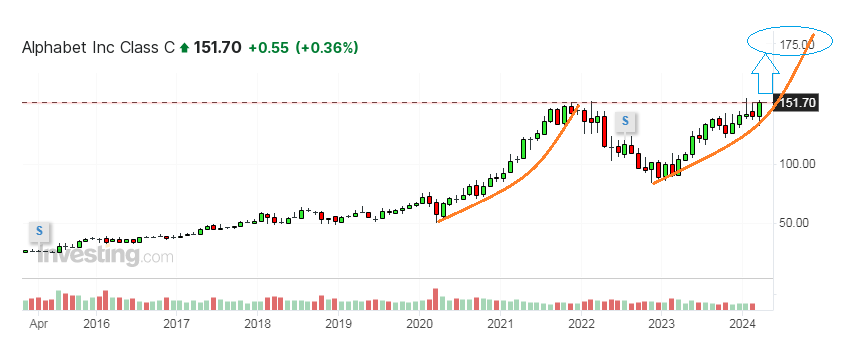Google Is Still Underestimated by Rating Agencies
Even though I have a solid portion of Google-parent Alphabet in my portfolio since a sharp retracement to nearly $120 in late October 2023, I believe it is reasonable to double my number of Google shares now. Google remains the only major mega cap stock, which has been hanging about the doorstep of its all-time highs, not daring to breakthrough so far, while so many investment houses continue to raise their target prices on Google, maintaining or shifting to Outperform quality ratings. This week Wedbush released the stock new price target of $175.00, which is almost $23 higher than the current price levels. The reputable analyst group not only cited usual phrases like "a positive outlook on the company's strategic direction", adding than Google is "well-positioned to continue its dominance in the search engine market and capitalize on new monetization avenues", but also mentioned particular strengths like "the integration and expansion" of Google's Search Generative Experience (SGE). Before underlining this belief, Wedbush finished its own independent comprehensive analysis of SGE tools, using a test of 1,200 unbranded Google Search queries. The tests were made to compare SGE with non-SGE results to reveal similar ad show frequencies per result page in favour of ad integration into SGE. Now Wedbush sees a growing belief that, in the long term, SGE could offer monetization opportunities that "match or surpass" those of traditional Google Search. This is a pretty strong. The current ad loads in SGE are tight already, Wedbush investigation added, which are admitted as a positive sign for "the platform's future economic performance". Similar considerations allow me to increase my bets in Google, taking into account a promising agreement with Apple on building its Gemini AI environment into new iPhones, and also that a coalition of tech companies, including Qualcomm and Google are reportedly spearheading an initiative of developing an open-source suite of software tools capable of running AI applications across various types of accelerator chips, effectively targeting Nvidia's proprietary software ecosystem, according to Reuters. "We're actually showing developers how you migrate out from an Nvidia platform," Qualcomm's representative commented. The project's ambitions may extend beyond its founding members, with plans to cover cloud computing giants like Amazon and Microsoft Azure and NVIDIA's rival chip manufacturers, according to the same report. Google is the unique company that may use all chances of teaching its neural network powers with billions of YouTube videos. No Microsoft or Amazon, or chip and AI infrastructure manufacturers have that advantage. In combination with its very special position of a clear global search flagship, this makes me think that Google stock is underestimated by most rating agencies. So, when a big breakthrough will come, all that numbers like $175 or so will be perceived rather as a starting point before a more serious move up. A technically measured move from multi-year charts hints on this scenario as well. Therefore, buying Google just a little bit above $150 looks like making easy money on an underestimated asset everybody knows about.

Disclaimer:
The comments, insights, and reviews posted in this section are solely the opinions and perspectives of authors and do not represent the views or endorsements of RHC Investments or its administrators, except if explicitly indicated. RHC Investments provides a platform for users to share their thoughts on financial market news, investing strategies, and related topics. However, we do not guarantee the accuracy, completeness, or reliability of any user-generated content.
Investment Risks and Advice:
Please be aware that all investment decisions involve risks, and the information shared on metadoro.com should not be considered as financial advice. Always conduct thorough research, seek professional advice, and exercise caution when making investment decisions.
Moderation and Monitoring:
While we strive to maintain a respectful and informative environment, we cannot endorse or verify the accuracy of all user-generated content. We reserve the right to moderate, edit, or remove any comments or posts that violate our community guidelines, infringe on intellectual property rights, or contain harmful content.
Content Ownership:
By submitting content to metadoro.com, users grant RHC Investments a non-exclusive, royalty-free license to use, display, and distribute the content. Users are responsible for ensuring they have the necessary rights to share the content they post.
Community Guidelines:
To maintain a positive and respectful community, users are expected to adhere to the community guidelines of Metadoro. Any content that is misleading, offensive, or violates applicable laws and regulations will be subject to moderation or removal.
Changes to Disclaimer:
We reserve the right to update, modify, or amend this disclaimer at any time. Users are encouraged to review this disclaimer periodically to stay informed about any changes.









